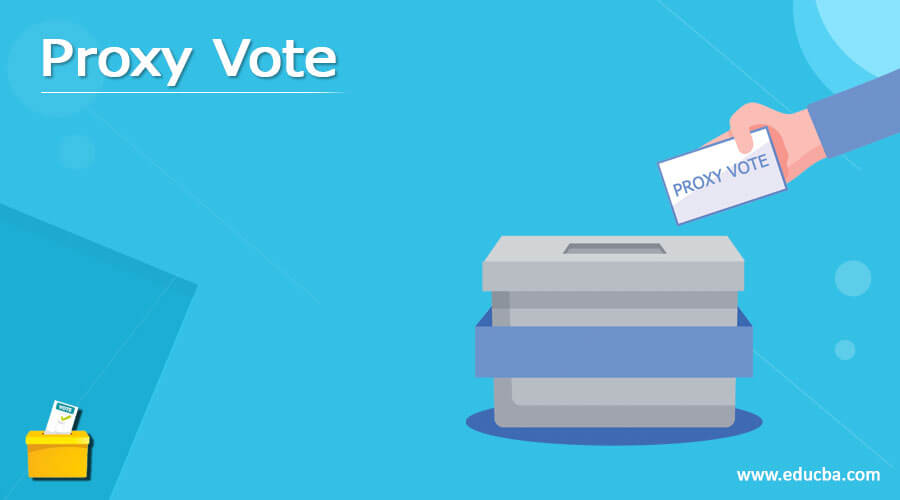Updated July 10, 2023

What is a Proxy Vote?
The term “proxy vote” refers to the method of ballot cast in which a single individual or firm can attend a company’s shareholder meeting on behalf of its shareholders who may not be able to attend the meeting for various reasons. The company sends the shareholders a proxy ballot in the mail and other related documents such as proxy statements, issues to be discussed and voted on during the meeting, etc.
How Does it Work?
Shareholders receive information about the topics to be voted on during the annual general meetings, and companies send them proxy materials that include annual reports, proxy statements, and proxy cards with specific voting instructions. The investors who possess voting shares in the company have the eligibility to vote on the issues discussed in these meetings.
In many cases, some shareholders choose not to physically participate in the shareholder meeting and instead elect someone from the company’s management team or a firm to vote on their behalf. The proxy, an individual or firm, is responsible for casting a proxy vote according to the shareholder’s instructions on the proxy card. The proxy vote can be submitted through mail, phone, or online, but it must be done before the cut-off time.
Examples of Proxy Vote
Now, let us look at the following example to understand the concept of proxy voting.
On 25th November 2019, Kirkland Lake Gold announced its plan to acquire Detour Gold in an all-stock deal, after which the two companies will merge to become a single entity. In this entity, the shareholders of Kirkland Lake Gold will own around 73% of the merged entity’s shares, while the shareholders of Detour Gold will own the remaining 27%.
The board unanimously approved the deal, but the shareholders were given the opportunity to vote for or against the acquisition. All eligible shareholders received the voting and proxy information, which allowed them to cast their votes or appoint a proxy to vote on their behalf. The company closed the acquisition deal in January 2020.
Source: BusinessWire
Reasons for Proxy Vote
Although there can be multiple reasons for different people, the following are the two most common reasons for which people opt for proxy vote:
Delegate to someone who knows more than the principal
In most cases, the shareholders have limited access to the company information time, making it difficult to analyze and understand what is happening within the organization. Hence, they prefer to delegate their voting rights to someone likely to be more informed than them.
The principal can’t attend the meeting in person
In some cases, the shareholders must attend the meetings in person, which is not feasible for many shareholders due to various logistical constraints. So, in the absence of remote voting, proxy voting seems to be a viable option to fulfill the voting responsibilities of the principal.
How to Apply for it?
If the principal can’t cast their vote in person, they must assign someone to vote on their behalf. The company sends information about voting and proxy to all shareholders with voting rights. The principal can request anyone registered to vote to act as their proxy.
Advantages of Proxy Vote
Some of the major advantages are as follows:
- First, it is useful for the shareholders who stay in remote places.
- It is an easier option for shareholders who are sick or have major disabilities.
- A principal with limited understanding can assign voting rights to a well-informed person, resulting in better corporate decisions.
Disadvantages of Proxy Vote
Some of the major disadvantages are as follows:
- There is no privacy in the vote between the principal and the proxy
- There are chances that the proxy may coerce the principal to obtain the authorization to vote on their behalf.
- The proxy may vote per their inclinations, ignoring the original voter’s preferences.
- Some shareholders may be unable to find an appropriate individual or firm to trust with their vote.
Key Takeaways
Some of the key takeaways of the article are:
- An individual or firm casts a proxy vote on behalf of a company’s shareholder who chooses not to vote on an issue or cannot attend the meeting in person.
- The company’s annual general meeting sends the eligible shareholders the voting and proxy information.
- A principal with a limited understanding of the issues can select a well-informed person to cast a proxy vote.
- The shareholder’s designated proxy is expected to cast a proxy vote according to the instructions on the proxy card. However, the proxy may ignore the original voter’s will and decide to vote as per their inclinations.
Conclusion
So, it can be seen that a proxy vote is an important tool for shareholders to influence the decisions of a company in the right way. The shareholders should understand their rights under the proxy voting mechanism and exercise them responsibly to help the company go forward.
Recommended Articles
This is a guide to Proxy Vote. Here we also discuss the definition, working, examples, reasons, how to apply for Proxy Vote, and advantages and disadvantages. You may also have a look at the following articles to learn more –

